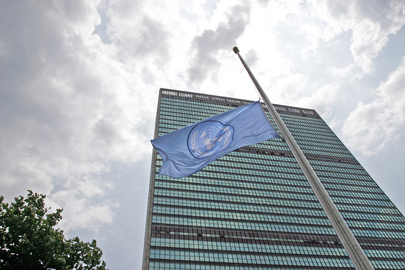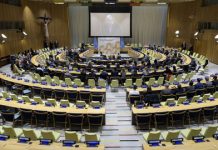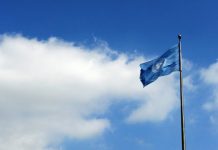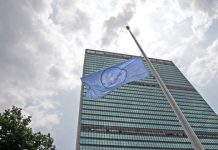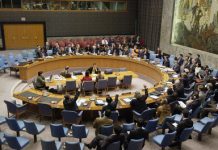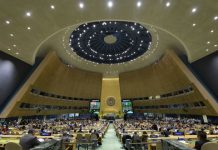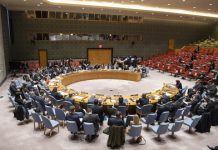Maryse Guimond: From the moment you enter, and that the gate is then closed behind you, and you enter where you go through different spaces around you that I have gone through, different types of interventions and so on.
It’s difficult for me to forget, for example, going through parts of Khan Younis that was it was completely grey. And you had around you, completely around you, all this devastation, all these buildings completely destroyed. And you could still see people living in some of them trying to make do with that reality. You would see some people in the streets trying to go for food or for water and so on.
And then as you keep proceeding – and that part was much less people – but as you’re moving towards Deir al-Balah, then you start seeing these kilometres of tents and makeshift settings and you see these very overcrowded spaces where people are basically sitting on top of each other and very, very limited type of makeshift.
You know, the Gaza Strip was already a very small space of 365 square kilometres for more than 2.2 million people, and now you’re seeing them being displaced to an ever smaller and smaller space as it goes forward. So, moving around in Al-Mawasi, Khan Younis or Deir al-Balah, you’re just surrounded by people. It’s extremely difficult to move and just to you know, and you’re surrounded by people who very often have been displaced multiple times.
There are some people I spoke with. They had been displaced five times. Others had been displaced ten times since October. Everyone with extremely difficult stories. One has to understand that, you know, families, whole families have been wiped out in some of these airstrikes. And then you meet people and everyone who you meet has these very, very dire stories.
UN News: What did the woman in Gaza tell you? What was their message?
Maryse Guimond: The message? Well, the first one was: ‘When will this war stop?’, which was very often followed by: ‘When will we be able to go home?’ – knowing very often that home has been completely destroyed. But the idea of being able to go back and to salvage some type of history of things – because, you know, your home is not just a structure – it takes part of your memories of your families and everything else, of your pictures.
And I have to say that it was very difficult also when children would ask us and would ask me, when will this war be over? When do I go back to my life? This has been going on for nearly nine months now, and so the women are very much also explaining the reality of every day, trying to access food… They have to wait very often in lines in different parts when there is food. Everything is difficult. Accessing resources like water, food, health services and so on, it can be quite demanding. It takes a lot of time in this situation.
I think it’s important to understand that for the last nine months, you hear constantly the war, you never not hear it. So even while I was there for a week, I kept hearing the shelling, the bombardments, the drones. Even if they’re not close, they’re not in the street next to you, you are hearing it around, all around you.
Talking with the women, I’m also extremely concerned for those with children or for their families of what the future would be like and what they could expect after this. You have to understand that for a lot of women, now they’re also taking care of the children, of the elderly in the family, but also of persons with disabilities and their families. And there’s been, as you know, quite a lot of cases since the beginning of the war, with amputations and so on. So, we’ve seen a growing number also. So that’s been their reality and what they’ve been expressing.
UN News: Could you also tell us more about UN women’s efforts on the ground to help those women in Gaza?
Maryse Guimond: Looking at Gaza, obviously we’re working with women and girls, but you have to think of the full community because everyone is affected at the end of the day. We’ve been working very much also with other sister agencies, for example, the World Food Programme (WFP), where with a partnership with them, we’ve been in February until March. We supported provision of food to female-headed households. And then we’ve been working also with the Jordanian Hashemite Charity Organization, as well as with the Egyptian Red Crescent and our offices in Jordan and Egypt, and bringing in dignity kits, which, you know, many women have been requesting from the start of the war.
We’ve been doing a lot of bringing in different types of very essential resources to the population. We also work with women-led organisations. They are key responders during this war. They are working with communities. They’ve been providing dignity care, a lot of psychosocial services. And you can imagine, as I was saying earlier, it’s been nine months of war, very close to everyone, with people multiply displaced. You can imagine the level of trauma, trauma of men, women and children. There’s been a lot of work to provide these types of services and other basic services.
UN News: A recent study conducted by UN Women found that, despite the devastation in Gaza, 56 per cent of women-led organizations are still operating at full capacity. Could you please tell us how UN Women in Palestine is supporting those organisations amidst the challenging work environment?
Maryse Guimond: All humanitarian actors would tell you that we’ve rarely faced this level of challenges and in trying to provide responses. Everyone would tell you that. However, when I look at women led organisation, as you’ve said, they’re still operational. It’s difficult. There’s nothing easy in what they’re doing. But it’s actually also very inspirational when you look at this capacity to continue. Some of them, like the rest of the population, have been displaced multiple times. Their offices have also been displaced as well as their own staff.
Despite that, they’ve been working with communities. Some of them have been working on safe spaces for women. They’ve been providing services, as I said, on psychosocial, but also the dignity care, providing basic products like mattresses and so on. They do serve their communities. As you said, though, it is quite amazing to see. And they to do require more support in the coming period so that they can continue this very essential work.
UN News: The war in Gaza is often described as a war on women. Could you elaborate on that in light of your recent visit to the strip?
Maryse Guimond: Look, I mean, wars affect all people of a population, obviously. However, we have rarely seen this level of killing and injuring of women. We were reporting a few weeks ago that more than 10,000 women had been killed. When you look at the numbers of fatalities and injuries of women, it’s unprecedented. And this is why very often we do speak of a war on women.
UN News: Do you have a final message?
Maryse Guimond: Ceasefire would be very, very important, I think. This is the message that the people of Gaza are bringing forward. And I would like to reinforce that message. Every day that this war continues only brings more destructions and killing. There has to be a stop. We need to move to a just and sustainable political solution that involves everyone.
I would also like to pay attention to another element before I forget: that the women were saying, and I think we need to hear that, is that one of the things they felt that they’ve been losing besides everything else I’ve mentioned, also their dignity there, which is also extremely important.
Source of original article: United Nations (news.un.org). Photo credit: UN. The content of this article does not necessarily reflect the views or opinion of Global Diaspora News (www.globaldiasporanews.com).
To submit your press release: (https://www.globaldiasporanews.com/pr).
To advertise on Global Diaspora News: (www.globaldiasporanews.com/ads).
Sign up to Global Diaspora News newsletter (https://www.globaldiasporanews.com/newsletter/) to start receiving updates and opportunities directly in your email inbox for free.


